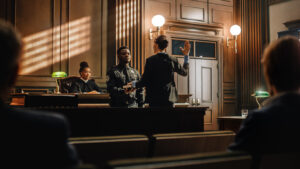Expert Witness

In personal injury cases, expert witnesses play very different roles than lay witnesses. The use of expert witnesses is routine in, for example, medical malpractice and product liability cases. They are also common in car accident and truck accident cases. Since expert witness testimony is powerful evidence, selecting the right expert witness can make or break your case.
Expert Witnesses and Personal Knowledge

A lay witness testifies about their personal experience: “I saw the defendant’s car run a red light and collide with the plaintiff’s car.” By contrast, an expert witness who wasn’t even at the scene of the accident could analyze skid marks and give their opinion on which driver caused the accident.
The Payment of Expert Witnesses
You’re certainly going to have to pay your expert witness for all the work they do for you. Unless the opposing party also uses an expert witness, they will certainly make sure the court knows the witness is being paid. The idea is to suggest that your witness might be biased. Normally, this tactic is not effective—the use of expert witnesses is routine in personal injury cases.
The Expert Witness Industry
There exists an expert witness industry, and “expert witness” is a profession. A person might have entered the workforce as a pharmacologist, for example. After 15 years of practice, they may have decided to retire as a pharmacist and work full-time as an expert witness testifying on issues related to pharmacology and toxicology.
Lawyers often prefer expert witnesses because they have extensive experience testifying. They are unlikely to wilt under the pressure of cross-examination. Expert witness agencies connect expert witnesses with lawyers who need them. Most experienced personal injury lawyers have working relationships with expert witnesses who they have worked with many times.
Qualifying an Expert Witness
A court will consider the following factors when deciding whether to qualify someone as an expert witness:
- Academic degrees
- Professional experience
- Publications, especially in professional journals
- Professional reputation
- Specialized certifications, licenses, or credentials.
Although the court won’t care about the expert’s testifying experience, your lawyer will care, and you should, too.
Testifying Witnesses vs. Consulting Witnesses
It’s fairly simple–a testifying witness testifies, and a consulting witness consults. If you retain a testifying witness, you have to inform the other side that you’re using the witness, and you have to provide details of their identity. The opposing party has the right to subpoena that witness to a deposition.
A consulting witness, on the other hand, simply helps your lawyer research your case. You don’t have to notify the opposing party that you’re using a consulting witness. Once you retain a consulting witness, conflict of interest rules prevent the opposing party from using the same witness for the same case. Your lawyer might use an expert witness who provides unfavorable testimony as a consulting witness, for example.
Types of Expert Witnesses
There are hundreds of different types of expert witnesses, including the following:
- Accident reconstruction experts who analyze accident scenes to determine the sequence of events
- Biomechanical experts who provide insights into how injuries may have occurred
- Chiropractic experts analyze soft tissue injuries and spinal alignment issues, especially in car accidents
- Emergency medical experts offer insights into initial treatments and the severity of injuries
- Functional capacity evaluators assess an individual’s ability to perform work-related tasks after an injury
- Medical experts offer specialized medical knowledge to clarify the nature and extent of various injuries
- Orthopedic surgeons assess bone and joint injuries.
- Physical therapists evaluate rehabilitation progress and future therapy needs
- Psychiatric experts assess mental health issues that might arise from a personal injury
- Rehabilitation specialists design plans for physical or occupational therapy
- Toxicology experts analyze the impact of substances on an individual’s system
- Vocational experts assess the extent of your diminished earning capacity after an injury
Remember that the other side can call their own expert witnesses. Sometimes, a trial or a deposition becomes a “battle of dueling experts.”
The Uses of Expert Witnesses
Expert witnesses are useful in an astonishing variety of ways, including:
- Accident reconstruction
- Ballistics analysis (concerning firearms, ammunition, and related evidence)
- DNA analysis
- Environmental assessment (environmental impact and compliance in toxic tort cases, for example)
- Determining the causes and origins of fires
- Medical assessment
- Analyzing substances in biological samples to assess poisoning, drug use, or chemical exposure
A full list of the potential uses of an expert witness would require an entire volume, if not more.
A Denver Personal Injury Lawyer Can Help You Work With Expert Witnesses
You might have heard about lawyers and “billable hours.” Well, personal injury lawyers don’t work that way–at least the ones who represent plaintiffs (victims). Instead, they charge legal fees based on a contingency fee system. Under this system, your legal fees equal a pre-agreed percentage of whatever amount your lawyer manages to win.
Private settlement or jury verdict—it doesn’t matter which. Either way, you’ll end up paying 30% to 40% of the amount in legal fees. And if your lawyer doesn’t win? Your legal fee will be zero. This allows you to secure excellent legal help and expert witnesses without having to pay attorneys’ fees upfront. Call Zaner Law Personal Injury Lawyers at (720) 613-9706 or contact us online to schedule a free consultation to protect your rights and maximize your chances of favorable compensation.

